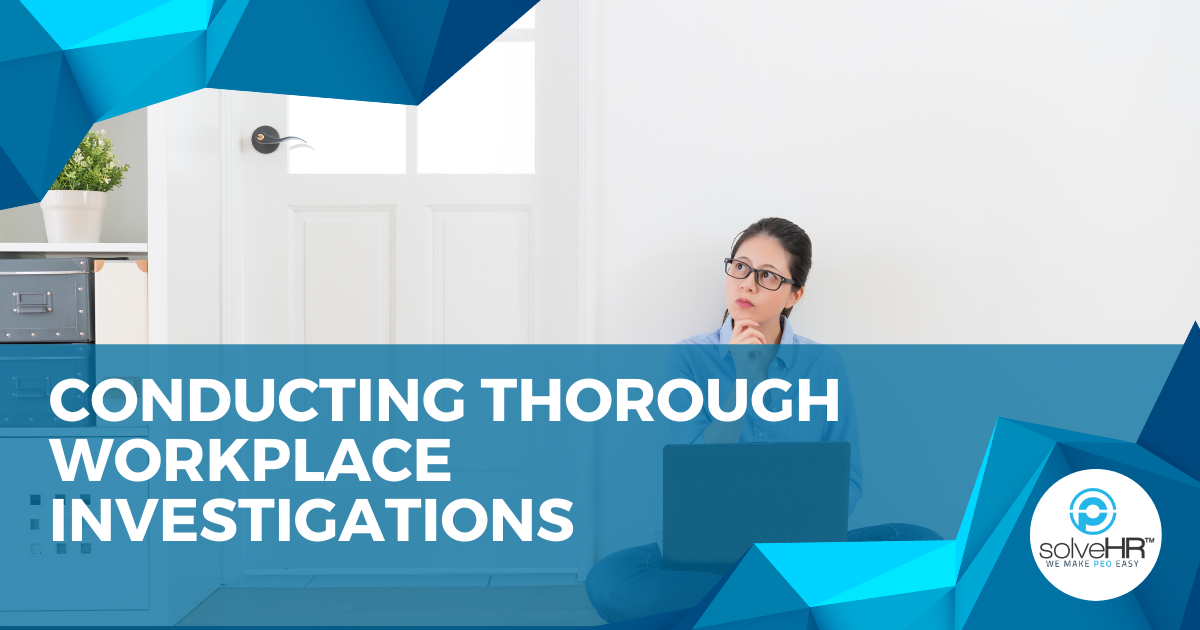The Importance of Conducting Thorough Workplace Investigations

Workplace conflicts, complaints, or accusations can arise in any organization, but how these issues are handled can have a significant impact on both the company's culture and its legal standing. Whether it's a claim of harassment, discrimination, retaliation, or a safety concern, employers are legally obligated to investigate complaints promptly and effectively. At SolveHR, we understand the critical nature of workplace investigations and offer expertise to guide companies through this sensitive process.
Why Workplace Investigations Matter
When an employee makes a complaint, whether formal or informal, employers have a responsibility to act swiftly. Under laws such as Title VII, the Americans with Disabilities Act (ADA), the Age Discrimination in Employment Act (ADEA), and the Occupational Safety and Health Act (OSHA), employers must take immediate steps to address the situation, ensure the safety of all parties involved, and begin a thorough investigation. Failing to respond appropriately could lead to legal challenges and damage to the company’s reputation.A well-handled investigation benefits both the company and its employees by:
- Addressing issues before they escalate
- Protecting the rights of both the accuser and the accused
- Enhancing organizational credibility and fostering a safer workplace
9 Steps to Conduct a Thorough Workplace Investigation
At SolveHR, we recommend following a structured approach when conducting investigations to ensure they are fair, thorough, and legally sound. Here are the essential steps every organization should take:
1. Ensure Confidentiality
It’s crucial to protect the confidentiality of the complaint as much as possible, while being honest that absolute confidentiality cannot be guaranteed during the investigation. Information may need to be shared with relevant parties on a need-to-know basis to conduct a fair investigation.
2. Provide Interim Protection
To protect the accuser from potential retaliation, consider taking immediate steps like schedule changes, transfers, or leave of absence. However, be cautious to avoid actions that could be perceived as retaliatory, such as involuntarily transferring the accuser.
3. Select an Appropriate Investigator
The investigator should be impartial, with no stake in the outcome. HR professionals, internal security, or external third-party investigators are often used, depending on the situation. Choose someone who can remain objective and who has knowledge of employment law and investigative experience.
4. Create a Plan for the Investigation
An effective investigation requires a well-thought-out plan, including an outline of the issue, a list of witnesses, sources for evidence, and a system for retaining documentation such as interview notes and emails.
5. Develop Interview Questions
Prepare relevant, open-ended questions designed to elicit facts without leading the interviewee. This helps gather accurate information without bias.
6. Conduct Impartial Interviews
The investigator must remain neutral during interviews with the accuser, the accused, and any witnesses. Carefully document each interview and assess the credibility of each party. Avoid leading questions or giving any indication of bias during the investigation process.
7. Make a Decision
Once all interviews are completed and evidence is collected, the investigator must evaluate the findings to make a recommendation. The final determination should be made by management, legal counsel, or a designated decision-maker based on the investigation’s results.
8. Communicate the Outcome and Close the Investigation
Notify both the accuser and the accused of the outcome. Ensure the accuser feels heard and that the organization took the complaint seriously. Set up follow-up meetings to ensure the complainant is comfortable returning to the work environment.
9. Document the Investigation
Prepare a final written summary of the investigation, including the complaint, parties involved, key findings, and the conclusion. This documentation is critical should the situation escalate to legal proceedings.
Why a Structured Process Matters
By adhering to a structured investigation process, employers can prevent issues from becoming widespread and demonstrate that they took complaints seriously. This approach not only protects the organization from legal risks but also fosters a more transparent, respectful, and safe work environment.Workplace investigations are critical to maintaining a positive and safe work environment. With a systematic approach, employers can resolve issues effectively, protect employee rights, and safeguard their organization from legal risks. SolveHR is here to help your company navigate the complexities of workplace complaints and ensure that every investigation is handled thoroughly and professionally.At SolveHR, we offer expert guidance to help businesses manage complaints and investigations with confidence. From providing legal counsel to guiding you through the investigation process, our services ensure your organization remains compliant and employees feel heard.For more information on how SolveHR can assist your organization with workplace investigations, contact us today.
Experience Hassle-Free Payroll Today
Request a demo to see our services in action!

